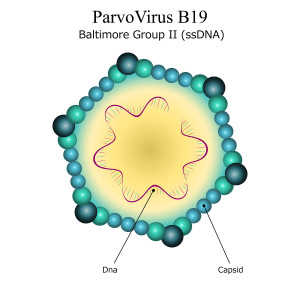
Cronulla Veterinary Clinic can diagnose illness in your dog. Servicing Sutherland Shire, Sydney.
Parvo in dogs is a viral disease that affects the gastrointestinal tract. It can occur in both puppies and adult dogs, and can be severe in young puppies (it attacks their heart muscle).
In the Sutherland Shire we are very fortunate that we don’t routinely see outbreaks of serious diseases such as Parvo, Distemper and Hepatitis. However, this doesn’t mean we can be complacent about protecting our pets, as we do see these diseases from time to time. Usually, these are isolated cases.
For example, we sometimes see Parvo in newly purchased puppies, who have been infected but didn’t start to show signs of sickness until they were in their new home. The incubation period of Parvo is usually 3-7 days, so you may not realise your puppy is sick when you first bring them home.
Parvovirus is a very hardy and very contagious virus, and can survive in the environment for a very long period of time (up to a year) after an affected dog has spread it. It can be spread by faeces, but also more indirectly via the paws of infected dogs, skin, shoes, clothes, and other items (even car tires) that have been in contact with the virus. Cats can potentially carry and shed Parvovirus as well, although it does not affect them. This disease is still under investigation; not everything is well understood.
Parvovirus enters the body via the tonsils and attacks the white blood cells. Then, it enters the bloodstream and attacks rapidly dividing cells from the bone marrow (causing immunosuppression) and the intestinal wall (causing severe nausea and watery bloody diarrhoea). When the intestinal tract is damaged enough, the virus enters the bloodstream to wreak further havoc. In young puppies the virus can also attack the heart muscle cells, leading to heart problems and death.
Symptoms of Parvo infection can range from lethargy and lack of appetite to vomiting and diarrhoea, abdominal pain, dehydration, severe tissue damage, shock, toxin production, secondary infections, and even death.
It is a very serious illness.
The sooner veterinary care is sought the better, but even then, with all the treatment support we can provide, the outcome can still be a sad one.
Treatment is costly as it requires hospitalisation and intensive care treatment in an isolation ward, and may take a long time. Unfortunately, despite all efforts, not all dogs recover, either because of the parvo infection itself or due to complications.
After recovery, a patient can still shed the virus for a while. It is impossible to say how long exactly the shedding can continue for, but anywhere from 2-5 weeks after recovery has been reported. As mentioned before, the virus is very hard to destroy, so it is best to isolate the pet and avoid contact with grass, couches, carpets, and so on as much as possible.
Parvo can resist most household disinfectants. The best way to disinfect the environment is with a dilute bleach solution of 1 part bleach: 24 parts water on a regular basis.
The best way to protect not only our pets but our community as a whole is routine vaccination schedules. Puppies should be vaccinated at 6-8 weeks, at 10-12 weeks, and at 14-16 weeks, and then should receive yearly boosters. During an outbreak the protocol may need to be adjusted.
Even with a perfect vaccination schedule, sometimes individuals may not have an optimal immune response. For example, this may occur due to underlying immune suppression at the time of vaccination. By routinely vaccinating our pets (dogs and cats), we aim to protect the individuals from contracting the disease as well as reducing the chance of disease transmission overall.
If you are worried your dog may have Parvo, please contact us immediately.
